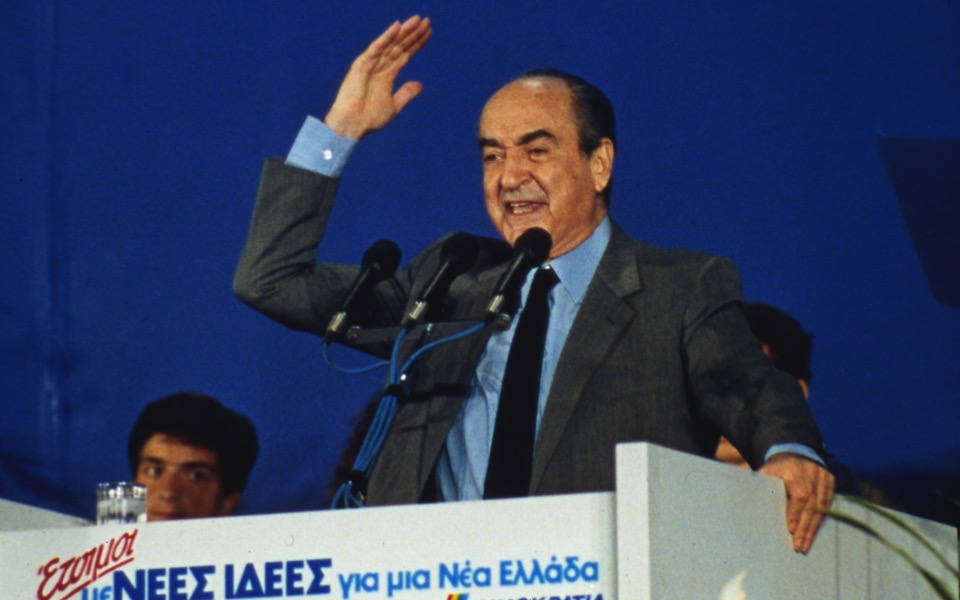In memoriam

Each of us is a self-contained world within the wider world and its parts. Each person’s universe is different from that of another. This is why I think it inappropriate to use adjectives when describing a fellow man – something that is quite customary in such obituaries.
A society judges a man by his participation in and contribution to improving the quality of life of all its members. This is why I will mention a few incidents that illuminate how Constantinos Mitsotakis viewed his role in our society.
To begin with, let me say that I was a friend of the former prime minister throughout the so-called Metapolitefsi [the period of democratic restoration after the military dictatorship], and an associate of his since the days of the Party of New Liberals. I was privy during this time to the former prime minister’s actions and thoughts.
What I admired about Constantinos Mitsotakis’s attitude to life was that he was completely at peace with himself, something very difficult for someone who was so active. I believe that he acted on the basis of Kant’s categorical imperative. Not as the result of intellectual ferment but more as a creative sensibility. Let us not forget that when he studied at Athens University, the influence of Kant was dominant, through the teaching of Theodorakopoulos, Tsatsos, and others. The result was that he dealt with events and people with absolutely no sentimentality. His narrative was like reading a history book 50 years after the events. Right up to the end. When he was in a dialogue with his beloved Marika.
As prime minister he never commanded or demanded. He always asked if something was possible or within the limits of what is allowed. As a result the requests of friends and supporters (mostly financial) of the party were not met in most cases. And he was subjected to their silent criticism and their attacks. Until one day, on November 2, 1992, when Marika wrote a letter to a person who was formerly a close friend and then a vehement critic (obviously complaining that some irregular demand had not been satisfied): “I would never have written to you as for the past two years we have not been as close as we once were… I will accept many things when it comes to myself, be it criticism or anything else, but I will not hear a word against Costas Mitsotakis, my husband, this man who has honored his country since he was 20 years old.” I think this is enough to show his position on the crucial political problem that concerns the relationship between political power and financial interests – which, after all, reaped their revenge by bringing down his government.
On how the government worked, I will mention one incident. It was just before the start of the Andreas Papandreou trial and there was a lot of debate over whether the proceedings should be broadcast live on television or not. I argued to the prime minister against this idea. After weighing my arguments, the prime minister decided to put the issue to the judgment of the government committee, which decided differently.
One memory brings on another. Mitsotakis, from what I can gather, because I had not heard his opinion firsthand, did not have a fully formed view, let alone a decision, on indicting Andreas Papandreou. I remember clearly that when that discussion started in the press, a New Democracy MP made it the subject of a parliamentary question. Mitsotakis, being abroad, instructed me (at the time I was his political director) to pass on to the deputy his request to set aside the question. So it happened.
Papandreou was led to court by the ferocious attack of the press against him. None of the parties – not just New Democracy – could remain mere spectators in the central political issue of the day. Papandreou’s acquittal was also engineered by those managing the press.
Mitsotakis is gone. It is usual, in such circumstances, to say and to write, “The deceased leaves a void that is hard to fill.” Mitsotakis is gone. And now people admit that his predictions were entirely correct, that he had tried, as prime minister, to prevent the crisis toward which the country was already heedlessly walking. A life-and-death crisis for the nation. To only thing I can add, in tears, is that the nation did not want to or could not avail itself of the service of one of the two most lucid and coherent political personalities and minds of postwar Greece.
“You will see him where there is no darkness.”
* Nikos Linardatos was the political director of Constantinos Mitsotakis’s office and his deputy minister from 1991 to 1992.





